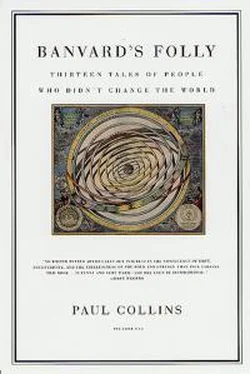After the meal, Innes walked over and kindly accosted him.
--We must speak in private. Will you visit my house?
At Innes's house, the two passed many hours in conversation; George could not yet speak English, but both were fluent in Latin. There were more visits; scarcely a one would pass without Innes thanking him and slipping a few coins into the youth's palm at the end. But when talk turned to George's other new friends--other ministers who wished, perhaps, to convert him--Innes would stop him.
--You needn't bother with them. They do not understand you as I do.
One day, when George was visiting, the two fell to discussing the Japanese language. Innes pulled down a volume of Cicero, opened it, and pointed out a passage of De Natura Deorum to the young man.
I want you, he said, to translate this into Japanese.
George froze. And then, without betraying his fear, he picked up a quill and began to write, moving his hand from right to left on the parchment. Innes watched him write, knowing--as George did not--that to achieve the conversion of an exotic Japanese like George would surely mean a promotion to a cushier post.
George finished writing, and Innes took the paper away.
--Here, he said, passing him another sheet. Do it again.
George sat miserably, staring at the lines of Cicero. He had just made up line after line of nonsensical shapes on a page--and now he had to repeat it? He wrote out the translation as best as he could remember it.
Innes took the second sheet and compared it to the first.
--Look, he showed them to George. Half the characters are different.
George grasped for an explanation, but Innes didn't need one.
--You need to be more careful from now on, he said.
George looked at his new mentor, shocked as the realization sank in.
They understood each other perfectly now.
In March 1703 the letter came from Henry Compton, the bishop of London, and Innes was overjoyed. They were to leave the regiment at the end of the year and proceed to England, where Bishop Compton would be waiting for them. But first a crucial matter had to be resolved: Psalmanazar was still an unconverted heathen. Innes took him to Brigadier Lauder's house for one last time, and in the presence of the commander the Formosan heathen was baptized a Christian. Lauder gratefully presented him with a gilt pistol and a glowing letter of commendation--everything Psalmanazar needed to travel to England in safety.
Innes gathered together a suit of cast-off clothing for George to wear for his voyage. It was much too big for George; he felt a bit ridiculous as his sleeves and pants flapped about in the wind. And yet the young savage was feeling rather pleased with himself as he and Chaplain Innes prepared to set off. The chaplain, too, was feeling quite clever. He had talked George into altering his story a little--he was now a native of Formosa, not Japan, as Formosa was a land about which Europeans knew nothing except its name. If asked about his old story, George was simply to say, yes, I am also Japanese, as Formosa is a possession of Japan.
Now that Innes had converted the famous Formosan, his promotion in the church was assured. The only question was how to rid himself of his convert when he was no longer of use.
--When we are in London, he said to George, I will recommend that you be sent to Oxford. They will be most interested in learning the language of the Formosans.
Here is the sight that greeted George one wintry day, as he and Innes entered London: severed heads. Bristling from the first arch of London Bridge were frozen, disembodied heads staked through with spiked poles, gazing without sight as ships passed by on the River Thames and carriages entered the city across the bridge below. They were the heads of miscreants and frauds, left out to rot until three full tides had passed.
George and Innes had already barely survived the crossing from Holland: a sudden storm had risen up and threatened to wreck the ship. But now, alive and in sight of their goal, they had more worries.
--You must prepare, Innes would hiss. Your language--you must prepare it.
Still, they could not have arrived at a better time. London--filthy, fetid, royal, teeming with money and vermin--had just surpassed Paris to become the largest city in Europe. It was the pool to which the swirling dregs of an empire drained, and its inhabitants held a conquering nation's moneyed fascination with the curious, the bizarre, the passing strange. Walking past Painter's Coffee Shop, George could peer at a giant eel on display; the proprietor offered a money-back guarantee if a patron could "say that he has seen a greater." George was an altogether better catch: a natural curiosity that could speak, and write, in impeccable Latin.
Psalmanazar was brought forward to greet the bishop and presented him with a sheet of paper. It was the Lord's Prayer written in Latin, and then rendered again in George's native Formosan. Scholars puzzled over the document, and agreed-the savage's words made no sense, but the grammar was so regular, so logical, that it must be a real language. The Formosan, it seemed, was every bit as real as Innes's letter had promised. Soon every noble's door in the city was opened to the chaplain and his noble savage.
Psalmanazar liked to shock his hosts.
--In my land, men are permitted to kill and eat their wives.
Forks dropped onto plates.
"But only if they suspect adultery," he added. When asked if he thought this barbaric, George would demur. Perhaps eating people is an uncivilized custom, he would admit, but it is not expressly forbidden in the Ten Commandments.
While George entertained London's upper crust, elsewhere in the city lay one of the only men who could prove him a fraud: Father Fountenay, a Jesuit missionary returned from China. Inevitably, the two had to meet; Hans Sloane, the brilliant polymath of the Royal Society, had invited them both to a Society meeting on February 2, 1704. The evening began with the usual matters natural and unnatural, and the examination of some ovarian cysts and a possum penis topped the list. Then, the secretary noted, "A letter was read from Mr.
Collins concerning a person who pretended to life without food."
Meanwhile, Psalmanazar cheerfully spoke gibberish to the assembled astronomers
and botanists as Father Fountaney glared at him.
"You are a fraud," Fountenay began, "for this simple reason: you say that Formosa is a province of Japan. It is not. It is a province of China."
"You are wrong," Psalmanazar replied flatly.
Fountenay sputtered on, but he faced an insurmountable problem: nobody else had been to Formosa. Every detail he gave, Psalmanazar calmly contradicted.
And then the impostor delivered a coup de grace: it was the Jesuits who kidnapped me from my native land. What would you expect from them except an attempt to discredit me?
Fountenay left in defeat; Psalmanazar was asked back the next week to dine with Sir Hans Sloane and other worthies of the Royal Society. Worse still, when the French priest was asked to venture what land Psalmanazar--who was probably from France himself--came from, Fountenay couldn't even guess. He'd never heard such an accent or language in his life.
But not every Society member was convinced. Later that evening in a tavern, one member approached Psalmanazar and asked him: How long does twilight last in Formosa this time of year? George gave the question little thought. But his questioner had given it a great deal of thought indeed, because with this simple question of astronomy he could detect the fraud. George would hardly have even known who his questioner had been: Sir Edmund Halley, the astronomer.
Halley and a few other members of the Society began to put it about town that perhaps Psalmanazar was not all that he appeared to be. But George now had powerful defenders like the Bishop of London and some of the members of the Royal Society. And Psalmanazar's most powerful defender, bar none, remained
Читать дальше











